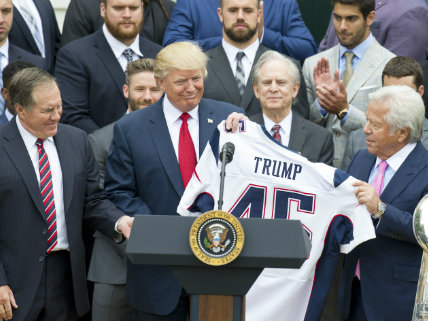That Time a Professional Football Team Fact-Checked The New York Times
An attempt to re-open the stupidest narrative of 2017 backfires spectacularly. When will the media learn to stop creating fake controversies?

It says something about the state of the media today—and something about how certain elements of the media are determined to stir up controversies around President Donald Trump, even where none exist—that a major newspaper found itself on the receiving end of a fact check from a professional football team this week.
Here's how it happened. Players and staff of the The New England Patriots were visiting the White House on Wednesday to celebrate their victory over the Atlanta Falcons in February's Super Bowl, as is traditional for professional teams (and college teams, and Little League teams, and so on) to do in the aftermath of winning a national championship. This whole "tradition" is not so much about celebrating a championship as it is about allowing the sitting president to glom onto a bit of the local goodwill generated by championship-winning teams.
(I did a bit of googling in an attempt to determine which president is the responsible for the creation of this vapid bit of White House pomp, but was unsuccessful. If anyone knows, please leave a comment so in the future we will know which POTUS deserves our scorn. Update: A few of you emailed and commented to point out that, fittingly, President Ronald "The Gipper" Reagan is responsible for starting this tradition, though some championship teams had been invited to the White House for various reasons since at least the 1960s.)
At best, it's a waste of everyone's time, the kind of event that—except perhaps on the sports pages in city where the winning team plays—deserves nothing more than a passing mention in the media.
So, naturally, the national media covers it like a major event.
That's why The New York Times had its sports editor, Jason Stallman, at the White House on Wednesday. After the handshakes and congratulations were finished, Stallman tweeted the following photo and commentary from the @NYTSports account:
Patriots' turnout for President Obama in 2015 vs. Patriots' turnout for President Trump today: https://t.co/OxMEOqZonI pic.twitter.com/pLmJWhOw1j
— NYT Sports (@NYTSports) April 19, 2017
This is, of course, an attempt to reopen the stupidest controversy of 2017: The one that erupted in the days after Trump's inauguration when aerial photos of the event were shown side-by-side with photos of the crowds at President Barack Obama's inaugurations in 2008 and 2012. Thanks to Trump's thin-skinned reaction (not helped by a silly gaffe by the White House photo staff), and the media's desire to make mountains out of any unimportant molehill that can somehow be connected to Trump, it became a week-long "scandal."
This time, thankfully, we didn't have to go through that because the New England Patriots stepped in to correct the record.
These photos lack context. Facts: In 2015, over 40 football staff were on the stairs. In 2017, they were seated on the South Lawn. https://t.co/iIYtV0hR6Y
— New England Patriots (@Patriots) April 20, 2017
Comparable photos: The last time the #Patriots won two Super Bowls in three years, 36 players visited the White House. Today, we had 34. pic.twitter.com/Aslvf1RaXU
— New England Patriots (@Patriots) April 20, 2017
Stallman later apologized and took responsibility for the whole thing, telling The Washington Post: "Bad tweet by me. Terrible tweet. I wish I could say it's complicated, but no, this one is pretty straightforward: I'm an idiot. It was my idea, it was my execution, it was my blunder. I made a decision in about four minutes that clearly warranted much more time."
But not before the president took the opportunity to comment:
Failing @nytimes, which has been calling me wrong for two years, just got caught in a big lie concerning New England Patriots visit to W.H.
— Donald J. Trump (@realDonaldTrump) April 20, 2017
Here's the thing. Trump is right. The Times was wrong. And the public's trust of the media takes another little hit that might make it slightly less likely for someone to believe the Times the next time they are right and Trump is wrong.
All of that happens because of a foolish attempt to create a controversy where there isn't one.
Which is not to say that Trump does not deserved to be criticized. He does. Immeasurably so. He's a man who ran for office promising to stop doing things like bombing the Middle East and waited less than 90 days before going back on that promise. His personal finances and the ways in which he might be using the office of presidency to enrich himself, his family, his company, and his friends should be at the center of attention as often as possible.
The creation of silly, pointless, and false controversies only detract from the seriousness of the real ones. Sure, it was The New York Times that messed up this time, but they're hardly the only ones to blame for this sort of thing. The fact that Stallman was wrong is actually helpful here, because if he had been right, we would have been subjected to days of cable news debates over why fewer Patriots were at the White House this year, and why it matters, and what it says about the president.
Who cares how big Trump's inaugural crowd was? Who cares how many members of a professional football team visited the White House this week? Who cares about the size of the president's hands? How many times will we have to go down this road?
My guess is that this won't be the last time, and the media will continue losing credibility each time it happens.
The only way to get to the bottom of this is to demand an investigation into the ties between Donald Trump, Russian agents, and the owners of the New England Patriots—oh, wait, that's already happened.


Show Comments (73)